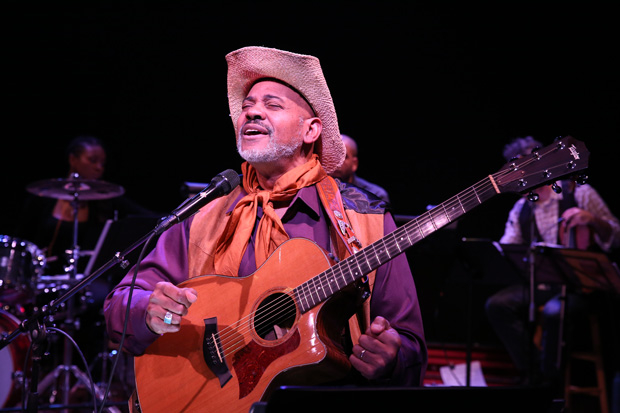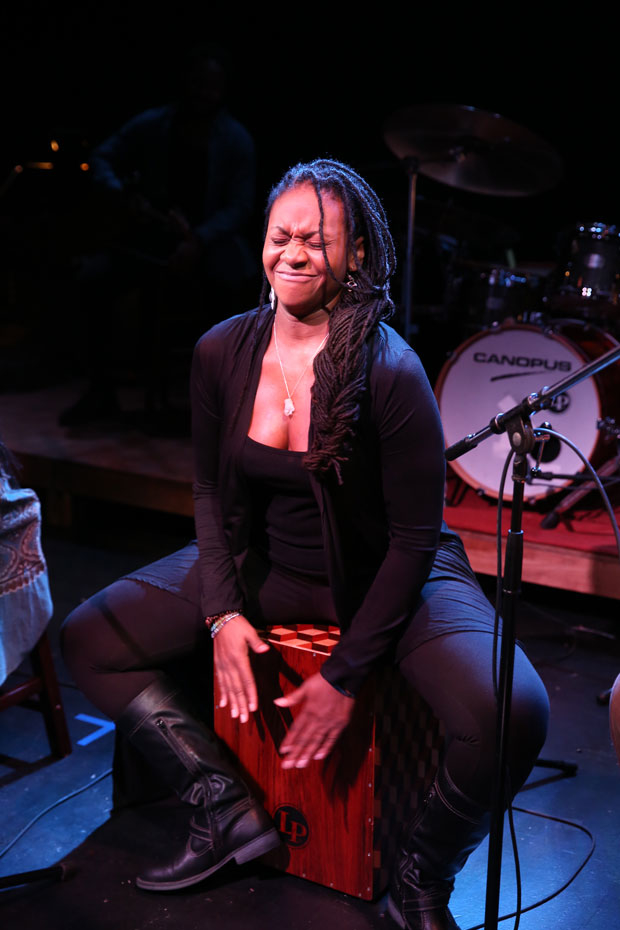Cross That River

(© Carol Rosegg)
Concert stagings of musicals often differ dramatically from full-fledged productions. There's usually little or no scenic design, and actors may perform with scripts in hand or from behind music stands. Yet this format serves some works as well as or better than a full production. Allan and Pat Harris's Cross That River, now playing at 59E59 Theaters, is one of them. That's because the show's music is its strong point.
Allan Harris's score adds color and character to the story of Blue, a slave who escapes his Louisiana plantation for life as a cowboy out west. The people he encounters are introduced by songs in various styles. There's the "Dark Spanish Lady" at a bordello (Mexican folk music), the "Mule Skinner" he hires as a cook (bluegrass), and a band of Comanche he tracks for the United States government (their deep, diaphragmatic grunts suggest tribal chanting). Blue himself sings and strums a mixture of jazz, blues, and country.
The music's impact, however, is blunted by Allan and wife Pat's lyrics, which are cluttered with clichés. The dark Spanish lady's eyes resemble "the stars in the sky," while life on the plantation is a "living hell" for Mama Lila, the great-aunt who raised Blue. Only in "Mail Order Woman" do the lyrics depart from the mundane: In one of bride-to-be's hands is the "leather satchel / that contained all her petticoats and dreams; / the other clutched the letter / from the fella who would get her / at the station in old Abilene."

(© Carol Rosegg)
Thankfully, the lyrics' shortcomings don't stop the actors from singing with conviction, especially Maya Azucena. When she delivers the spiritual "I Must Believe" as Mama Lila — face raked with pain, voice pealing with passion — she takes the whole audience to church.
The performances of the musicians, seated onstage behind the cast, also impress. Alan Grubner fiddles exuberantly; Miki Hayama's synthesized keyboards slice eerily through the action. Most dramatic is percussionist Shirazette Tinnin, who plays everything from a goblet drum to a rainstick to chimes. At one point she gets up from her drumset, sits a wooden cube downstage and plays it too, pounding the surface with her hands and boot heels.
Still, all the virtuosity on display can't hide Cross That River's unwieldiness. Characters barely have any personality beyond what the score's music supplies; some, such as Mule Skinner, surface for one song and are never heard from again. The sequence of songs careens from despair to elation and back again, landing awkwardly on the show's final number, "I Do Believe." After Cross That River has charted one historical injustice after another (the enslavement of African-Americans, the displacement of Native Americans, the confinement of women to the home), it ends with a brow-wrinkling paean to America — that "great land" where "the bells of freedom ring from shore to shore."
In a country where racial, gender, and economic inequality still clang louder than those "bells of freedom," Allan and Pat Harris's message rings false. Cross That River dares to wade into deep waters, but it gets swept away in the current.










